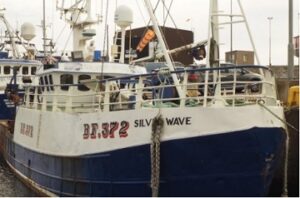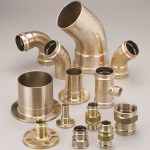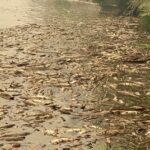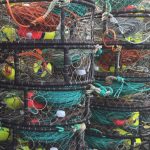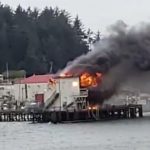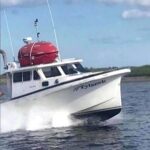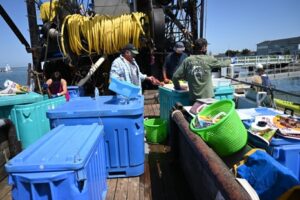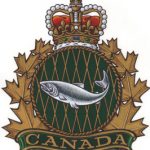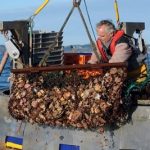Tag Archives: Open pen aquaculture
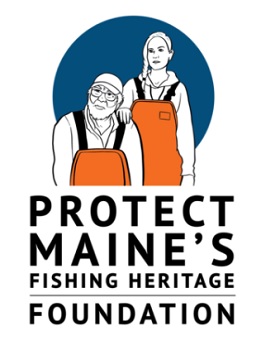
Many Questions Unanswered Following DEP Statement on Fish Die Off at Black Island
A Maine Department of Environmental Protection statement on the massive of die-off of nearly 116,000 salmon at pen sites off Black Island in mid-August raises more questions than it answers, according to groups concerned about industrial-scale aquaculture in Maine waters. The die-offs were discovered at the Cooke aquaculture pen sites on August 16 and weren’t reported to the DEP for almost two weeks. In a news release today, the DEP said that it had found no permit violations associated with death of the fish. Protect Maine’s Fishing Heritage Executive Director Crystal Canney said, “So the obvious question is – what killed the fish? You won’t find answers in the statement issued today, and we are still waiting to hear from the Department of Marine Resources, the primary regulating agency on net pen salmon. DMR was very quick to say that it was a dissolved oxygen issue, but the DEP has already ruled that out in its statement today.” >click to read< 16:48
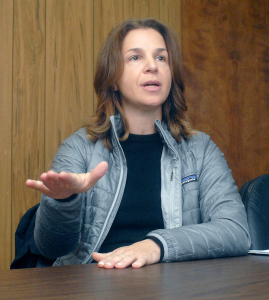
Washington DNR chief: Cooke to dismantle fish pens at Ediz Hook
State Department of Natural Resources officials began discussions Wednesday with Cooke Aquaculture Inc. representatives on dismantling the company’s Atlantic salmon fish farm off Ediz Hook, said state Lands Commissioner Hilary Franz, the elected head of DNR. Franz canceled the New Brunswick, Canada-based company’s aquatic-lands lease Dec. 15, citing violations including Styrofoam discharges, a defective anchoring system and operating 500 feet outside of its leasehold area by placing its anchors outside the boundaries set in the agreement. click here to read the story 15:43
Washington state senator says he’ll file bill to ban Atlantic salmon farming
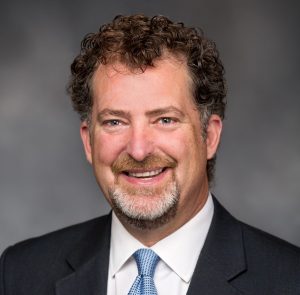 Under fire after a collapse and massive escape last summer, Atlantic salmon net-pen farming would be banned in Washington under legislation that will be filed by Sen. Kevin Ranker this coming session. The legislation would allow existing state leases for the eight Atlantic net-pen farms now operating in Washington to run out by 2025. No permits for new farms would be granted, and no renewals for existing leases would be allowed. The bill also would require state agencies that regulate net-pen farming to keep a tighter watch on operations. click here to read the story 13:30
Under fire after a collapse and massive escape last summer, Atlantic salmon net-pen farming would be banned in Washington under legislation that will be filed by Sen. Kevin Ranker this coming session. The legislation would allow existing state leases for the eight Atlantic net-pen farms now operating in Washington to run out by 2025. No permits for new farms would be granted, and no renewals for existing leases would be allowed. The bill also would require state agencies that regulate net-pen farming to keep a tighter watch on operations. click here to read the story 13:30
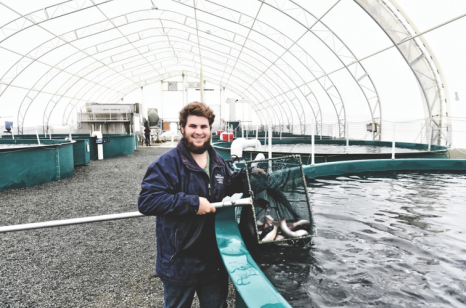
Land Based vs Open Pen Aquaculture – Fish out of ocean water dampen aquaculture enterprise
Some day, it might be possible to raise salmon in land-based closed containment ponds and make a profit. But that day is still a long way off, and even when it does become economically viable, land-based aquaculture might be like organic farming: an option for consumers willing to pay a premium, but which can’t replace ocean-based salmon farming. That’s not just the conclusion reached by the BC Salmon Farmers Association (BCSFA), it’s also the opinion of a Nanaimo businessman who owns a land-based fish farm. click here to read the story 12:39
‘Cover-up’ claim over ban on fish farm pesticide
 The Scottish Government put pressure on its environmental watchdog to drop a plan to ban a toxic pesticide in 2018 so as not to upset the fish farming industry. Emails released by the Scottish Environment Protection Agency (Sepa) reveal that senior government officials intervened directly to delete any mention of the proposed 2018 ban from a policy briefing for the environment minister, Roseanna Cunningham, following a complaint from the industry. The pesticide, known as emamectin and marketed as Slice, is widely used by fish farmers to kill the lice that plague caged salmon. But new scientific evidence suggests it is also causing widespread damage to wildlife in Scotland’s sea lochs. click here to read the story 09:10
The Scottish Government put pressure on its environmental watchdog to drop a plan to ban a toxic pesticide in 2018 so as not to upset the fish farming industry. Emails released by the Scottish Environment Protection Agency (Sepa) reveal that senior government officials intervened directly to delete any mention of the proposed 2018 ban from a policy briefing for the environment minister, Roseanna Cunningham, following a complaint from the industry. The pesticide, known as emamectin and marketed as Slice, is widely used by fish farmers to kill the lice that plague caged salmon. But new scientific evidence suggests it is also causing widespread damage to wildlife in Scotland’s sea lochs. click here to read the story 09:10
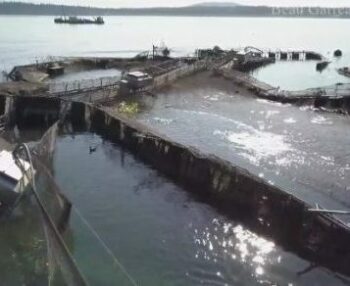
Cooke Aquaculture Fish farm has 60 days to fix net pens outside Seattle, risks losing lease
Just a week after the state Department of Fish and Wildlife approved shipment of 1 million more farmed Atlantic salmon to Cooke Aquaculture’s fish farm near Bainbridge Island, another state agency says it has found a hole in the nets and corrosion in the structure of the facility. The Department of Natural Resources on Monday notified Cooke that it is in default of the terms of its lease at its Rich Passage operation. It ordered the facility repaired within 60 days, or the department may cancel the company’s lease for the facility, which operates over public bed lands. click here to read the story 13:53
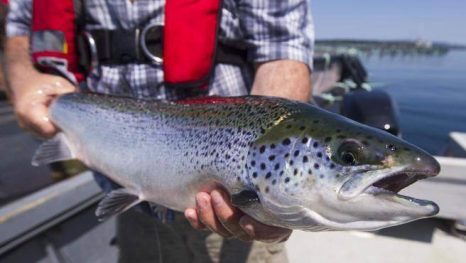
Study links fish farms to spread of antibiotic resistance
New research that finds a possible link between fish farms and the spread of antibiotic resistance doesn’t surprise marine biologist Inka Milewski. “Anytime you have animals grown in very concentrated conditions in these intensive livestock operations, whether it’s pigs or chickens, or in this case, fish, you’re going to have the potential for disease problems,” Milewski said in an interview Sunday from her home in the Miramichi in New Brunswick. “The solution to a lot of these problems is to put antibiotics into the feed. And so it should come as no surprise to anyone that they have found antibiotic resistance associated with fish farms.” The study released last week by Jing Wang of Dalian University of Technology in China concluded that genes for antibiotic resistance are getting into ocean sediments through fish food. click here to read the story 09:49
Marine feedlots and the tide against wild fish
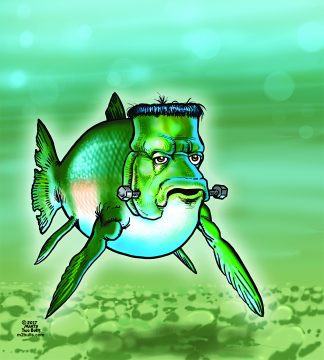 In a time of eclipse, for the People of the Salmon the moment was catastrophic. At the height of their season for the most prized of wild salmon in the Salish Sea, Lummi fishermen south of Cypress Island hauled in several flaccid, broken-mouthed farm fish, the first of thousands of Atlantic salmon that had escaped from a failed pen. They knew something was terribly wrong. Days would pass before Cooke Aquaculture, a subsidiary of the international company responsible for the pen, would stop blaming the sun and moon, and admit to the full scale of the collapse. click here to read the story
In a time of eclipse, for the People of the Salmon the moment was catastrophic. At the height of their season for the most prized of wild salmon in the Salish Sea, Lummi fishermen south of Cypress Island hauled in several flaccid, broken-mouthed farm fish, the first of thousands of Atlantic salmon that had escaped from a failed pen. They knew something was terribly wrong. Days would pass before Cooke Aquaculture, a subsidiary of the international company responsible for the pen, would stop blaming the sun and moon, and admit to the full scale of the collapse. click here to read the story
First Nations, environmentalists occupy salmon farm in British Columbia – A group of First Nations and environmentalists are occupying a salmon farm near Alert Bay, B.C., and say they won’t leave until the provincial and federal governments revoke permits for the facility. click here to read the story 10:43

Washington fish spill ‘a sad case of déjà vu,’ NL-CAR says
Leo White is shining a light on escapes of farmed fish here in Newfoundland after a recent incident at a Cooke Aquaculture site in Washington. White, a spokesperson the Newfoundland and Labrador Coalition for Aquaculture Reform (NL-CAR), said the escape of 305,000 Atlantic salmon on the west coast is “a sad case of déjà vu.”,,, “What has happened in Washington, and what continues to happen here in Newfoundland underscores the need for all new aquaculture proposals to complete a full environmental assessment,” White said. click here to read the story 09:55
Government will review Supreme Court order on $250M Placentia Bay project: minister
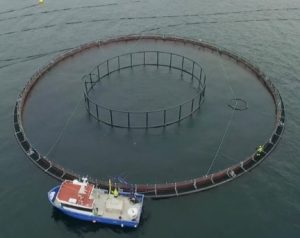 The Supreme Court of Newfoundland and Labrador on Thursday overturned the provincial government’s decision to release a quarter-billion dollar salmon farming project in Placentia Bay from further environmental assessment. Justice Gillian Butler ruled on July 20 that Perry Trimper, then the environment and climate change minister, “lacked jurisdiction” to release the project from a full environmental assessment, and that an environmental impact statement had to be completed. The impact statement would have required an ecosystem and population study of the wild salmon in Placentia Bay, as well as a contingency plan and extensive public consultation. click here to read the story 09:56
The Supreme Court of Newfoundland and Labrador on Thursday overturned the provincial government’s decision to release a quarter-billion dollar salmon farming project in Placentia Bay from further environmental assessment. Justice Gillian Butler ruled on July 20 that Perry Trimper, then the environment and climate change minister, “lacked jurisdiction” to release the project from a full environmental assessment, and that an environmental impact statement had to be completed. The impact statement would have required an ecosystem and population study of the wild salmon in Placentia Bay, as well as a contingency plan and extensive public consultation. click here to read the story 09:56
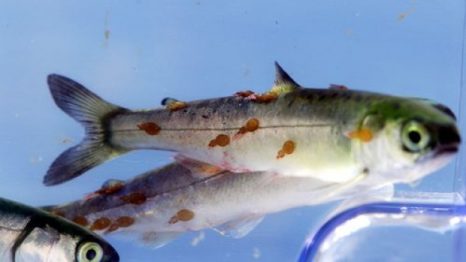
Salmon farms should be worried about more than just one species of sea lice
Migrating young sockeye salmon that are highly infected with parasitic sea lice grow more slowly, according to a new study from Simon Fraser University researchers. That matters, the experts said, because growing quickly can be the difference between life and death for vulnerable juvenile salmon. “Previous studies have shown that to survive to adulthood, young salmon need to get big fast,” said Sean Godwin, a PhD student at SFU and lead author on the study. “Those that grow more slowly — as we found, those heavily infected with sea lice — those fish are more likely to die.” Many people opposed to fish farms have raised concern over declining wild Fraser River sockeye and the potential for parasite transfer from salmon farms. click here to read the story 10:23
Timeline of proposed aquaculture expansion deemed too fast
 Monday is the deadline for public comment on a proposed, $75 million salmon hatchery in Marystown, one that has divided opinions in the community and far beyond. Norwegian company Grieg Seafarms is planning a major expansion of Newfoundland and Labrador’s aquaculture industry with a state-of-the-art facility, the largest in Canada, and sea cages in Placentia Bay and Long Harbour. But many don’t see the expansion as a positive move and they want the province to slow down. Read the rest here 12:35
Monday is the deadline for public comment on a proposed, $75 million salmon hatchery in Marystown, one that has divided opinions in the community and far beyond. Norwegian company Grieg Seafarms is planning a major expansion of Newfoundland and Labrador’s aquaculture industry with a state-of-the-art facility, the largest in Canada, and sea cages in Placentia Bay and Long Harbour. But many don’t see the expansion as a positive move and they want the province to slow down. Read the rest here 12:35

































